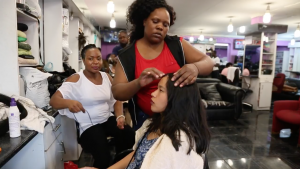As I read the previous posts and the responses on my first blogpost I would like to put stereotypes as a topic in the spotlight. Like Nathi said it is very important to identify the stereotpyes.
I point out the German movie 'Paradise : Love ' from Ulrich Seidl. Visually the movie is close to perfection in my eyes. The story is about a 50 year-old woman who goes to Kenya as a sex-tourism. Later it turns out the men want money from her. As I still think I like the movie, as harder I start to think about the topic. 'Heading South' is a comparing movie where three females go to Haiti for casual sex. It is quite shocking that we in the 21 st century still make movies about this. The black men become an object in the movies. They are presented as stereotypes alot of us have. The black men are pictured as the handsome men looking for woman, and the white woman are pictured as the ones with the money who can afford anything.

I have no idea if such kind of movies are also made in Asia/ Africa. I think as long as we make such movies or write such texts we keep on seeing those stereotypes, even if they are not even there. By stereotizing (I don't know if that is a word) things we still don't understand the others.
In my own practice I try to investigate where the stereotypes come from and how we see the other way because of those movies/ the media. For a project I went to an African hair saloon to braid my hair, and the people were quite sceptical about me braiding my hair the African way, the first 30 minutes I got completely ignored and looked at weirdly, but after they came to me and gave me compliments and liked it.

Ofcourse their is such as your own culture and having different habits from already over decades, for me the opening up and allowing is what is important at this moment.
I would like to know how your media in your country plays on stereotypes and if their are several texts/movies about this. I am up for any discussion!
Hi Tatjana,
As soon as I saw your post, I immediately said “OMG, I loveee that film” and felt happy that you wrote about it. I think it is super important and wonderful that you take note of all the unnecessary & unwarranted stereotypes, typecasting and stigmas that exist in our cultures, societies and countries at large. I do think, however, that highlighting such stereotypes in media, film is important especially if it’s done in a way that shines light on the fact that such stereotyping, racial profiling exists and presents them to the audience in a questionable way. Wouldn’t you agree? So I would say that such films and more should continue to be made. What Ushmita is talking about is true in that in India, a lot of films and ads for example highlight stereotypes in a mocking and humorous manner perpetuating the problem even more – THIS is not okay.
Tatjana typecasting is rampant in Indian Media/Films/Society. We are so used to creating stereotypes from the point of view of gender, caste, economic background, religious leanings, sexual orientation, language, the colour of the skin …the list just goes on. Let me talk a little about one of these here, namely colour of skin. India is one of the largest market in the world for fairness creams for women ( along with China), in recent years fairness creams for men have also made an appearance. Fairness, according to most of the advertisements equates success, beauty, leading to instant success, happy marriages, in short, a fairy tale life. It, unfortunately, arises out of a cultural hang-up about fairness, where girls are rubbed with grannies- home remedies and told to stay out of the sun, where skin bleaching before marriages is as common as matrimonial advertisements always asking for fair beautiful convent educated girls as best bride material. This colour bias transcends cultural and geographical markers like nationality, ethnicity, traditions, community, caste or race. The psychological implications are devastating due to this obsession. In recent years fairness products have proliferated and are endorsed by India’s leading film stars. You can google ‘Fairness cream advertisements India” and see the sheer number out there. A young artist I have collaborated with recently has done a touching performance piece on this issue. You can read about it here https://emergentartspace.org/forum/46588/
Hello Tatjana,
My favorite film genre is the action film, so I watch a lot Hollywood films, and it is interesting that in many Hollywood films pictured Mexico as the place where full of drugs, crime, killing. I discussed this stereotype with a friend of mine who originally came from Mexico, and both of us disagree with this magnified illustration of the downside of another culture with ignorance of the other sides.
” ‘He lives in the desert or in a dangerous place, wears a big hat, sports a mustache, and sleeps under a cactus bush. She cleans fancy houses, takes care of Anglo children and lives in a drug-infested neighborhood.’ These are just some of the portrayals of Mexicans and Mexico in several popular Hollywood movies. Other stereotypes of our neighbors south of the border: vicious criminals, heartless drug dealers, poor, uneducated undocumented immigrants. But that’s only one side of the story. And U.S. movies rarely portray the other side: Mexico’s charm, physical beauty and variety, indigenous and Spanish culture, and Colonial history.”
Eight examples of the problem Hollywood has portraying Mexico and Mexicans
http://borderzine.com/2015/04/8-examples-of-the-problem-hollywood-has-portraying-mexico-and-mexicans/
Dengke